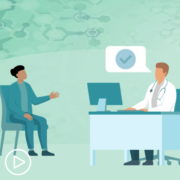How Can CAR T-Cell Therapy Care Partners Maintain Their Own Self-Care?
How Can CAR T-Cell Therapy Care Partners Maintain Their Own Self-Care? from Patient Empowerment Network on Vimeo.
Self-care is key for CAR T-cell care partners. Social worker Marc Paloma reviews ways that he helps support care partners and provides tips to maintain self-care while caring for your loved one. Marc Paloma is an outpatient hematology/oncology clinic social worker at University of Chicago Medicine.
See More from The Care Partner Toolkit: CAR T-Cell Therapy
Related Resources:

|

What Resources Are Available for CAR T-Cell Therapy Care Partners? |

Are You a CAR T-Cell Therapy Care Partner? Why You Should Ask for Help |
Transcript:
Katherine Banwell:
Yeah. How can they keep up on their own self-care?
Marc Paloma:
So, I try when they’re doing their follow-up, when the patients and care providers are here for the follow-up visits, I try to check in, “How are you doing?” I will remind care providers like, “Check in with yourself. How are you doing? How are you feeling? Are you feeling stressed out? Are you feeling okay today?” If possible, we also talk about having a plan from the outset at the beginning of the discussion for the CAR T of maybe having people, a small group of people that you can rely on so that if there’s a time that you need a mental health break, you can call one of your family members or one of your adult children or somebody from your faith organization or a neighbor. That small group of people that you may be able to rely on to say, “You know what? I’m needing a little bit of a break today.”
“It’s been maybe seven days, and it’s another day today we’re at home. I feel like I just want to take a bit of a break. Can I call my,” – the parents, or excuse me, “can I call the patient’s sister and have her come over, so I can go and have some time to myself?” Go to the library, read, or go out to lunch, or do a little shopping, or do whatever. Go for a drive or for a walk. So, I think those are important things. It’s almost like having a care partner for the care partner.
Katherine Banwell:
Yeah.
Marc Paloma:
You want your backup support people so that they are – they know that they’re supported and if they need some help, that they can get some.










